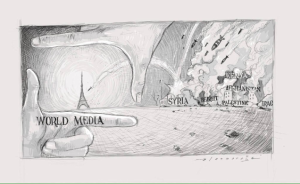By Gabby Lawson
On November 13, ISIS killed 130 people and injured over 300 others. Afterward, the attackers killed themselves. France was left in disbelief of what had occurred on its soil: the deadliest attack since World War II.
After the attacks, the attention of the world was fixated on France. There was a call for mourning and #PrayforParis posts on social networks. Everyone joining hand in hand, hashtag for hashtag, in support for Paris.
Along with worldwide mourning, other European countries and the United States have been on alert that ISIS may be coming to them. Yet, the thousands of deaths occurring by the hands of ISIS in the Middle East have yet to be mourned to the same degree as those in France. The lives of whites may deserve a greater degree of concern than the Arabic lives or any other non-white life.
Mentions of Syria here and there appear on the news but, there have been no desperate calls for sympathy and support of the world or booming social network trend. The violence in Syria began in March 2011; more than 200,000 people have died due to Syria’s brutal Civil War. In 2014, ISIS began confiscating land and killing those who do not agree with their extremist views.
Since September 2015, Israeli-Palestinian conflict has reached a boiling point. Increased attacks against Israelis are a result of incitement by radical Islamist groups like ISIS calling on Palestinian youth to murder Jews. In November, 10 people (one Palestinian and 9 Israelis) were killed in terrorist attacks, and 58 were injured. Among the non-fatal casualties, 22 were wounded in stabbings (including 5 in Jerusalem and 10 within Israel). 24 people were injured in vehicle attacks, and 12 in shootings.
In Kenya, serious human rights violations happen frequently. Kenyan security forces have been violently discriminating against Somali citizens. They have conducted several abusive counterterrorism operations targeted at those of Somali descent; including “extrajudicial killings, arbitrary detentions, and torture.” These unlawful killings of alleged terrorism subjects are almost always Somalian. Some have even been shot dead in public places and beaten during arrest. Sound familiar?
These lives are worth the same as those lost in Paris. However, they have not received the same acknowledgement. In fact, one can even go as far to say that this highlights white supremacy at its finest. Just a day before the ISIS attack in Paris, there was a suicide bombing in Beirut, Lebanon that killed 40 people. ISIS took responsibility for this atrocious attack as well. Nevertheless, no countries held light shows with the colors of the Lebanon flag and they definitely weren’t the filter on anyone’s Facebook profile picture.
The lives lost in each of the nations mentioned are far more numerous than those lost in Paris. The Paris attack received the same degree of acknowledgement as those on 9/11 in the United States. But the lives lost elsewhere have made many conclude that the lives lost in their country are not as important. In a New York Times article, a Lebanese commentator said, “When my people died, they did not send the world into mourning. Their death was but an irrelevant fleck along the international news cycle, something that happens in those parts of the world.” The implication, numerous Lebanese commentators complained, was that Arabic lives mattered less.
The lack of global reaction to the violence occurring in these nations is disturbing, especially the lack of concern for Arabic lives. However, it will continue to remain as such unless people of other cultures decide to join hand in hand to promote change in these countries. My condolences go out to those affected by the Paris attacks, but my condolences also go out to the lives of children and innocent people who lose their lives or family members every day in countries that face constant turmoil but do not receive the same attention.
